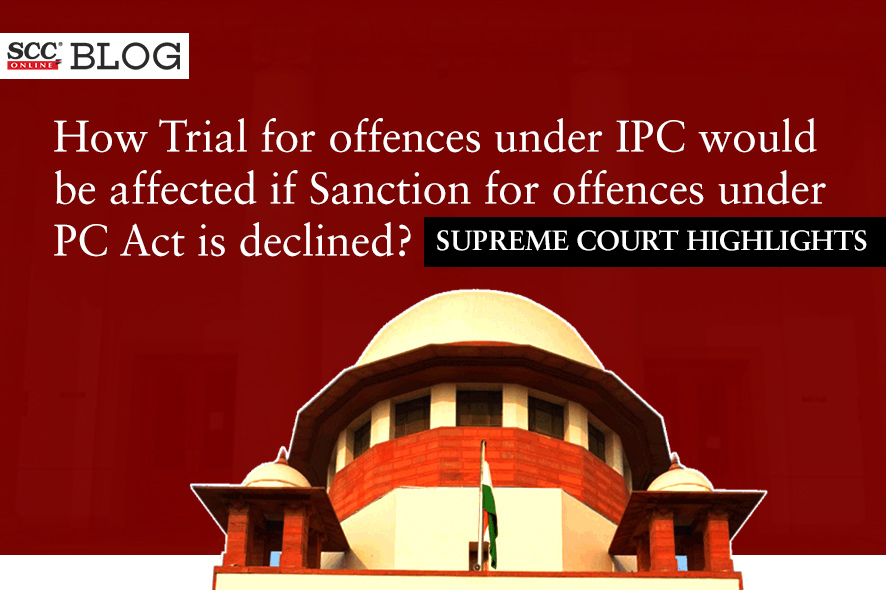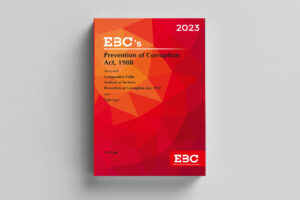Supreme Court: In a criminal appeal against the Judgment and Order of Telangana High Court, whereby plea to quash the criminal proceedings instituted against the accused 2 for the offence punishable under Sections 120-B read with Section 420, 468 and 471 of the Penal Code, 1860 (‘IPC’) was rejected, the Division Bench of B.R. Gavai and J.B. Pardiwala*, JJ. dismissed the appeal. Before departing with the matter at hand, the Court highlighted an important question that the sanctioning authority at the time of declining to accord sanction under Section 19 of the Prevention of Corruption Act, 1988 (‘the PC Act, 1988’) on the ground that sanction is being declined because the prosecution case against the accused could be termed as frivolous or vexatious, then, in such circumstances what would be its effect on the trial so far as the other offences under IPC are concerned?
Background
In the matter at hand, the accused 2 was serving as an Assistant General Manager, State Bank of India, Overseas Bank (‘Bank’), Hyderabad and was alleged of conspiring with other co-accused to cheat the Bank by sanctioning a corporate loan of Rs. 22.50 crore in favour of Sven Genetech Limited, Secunderabad. The case against the accused 2 was that he approved the release of corporate loan without compliance of all the principle/disbursement conditions and also approved release of cash credit limit of Rs. 10 crores on the recommendation of another accused person, who was the Regional Manager, despite having knowledge of non-instalment of machinery proposed to be purchased out of the corporate loan amounts. It is alleged that the accused 2 gave the said approvals with the fraudulent intention to cause wrongful gain to the other accused persons.
Subsequently, the Central Bureau of Investigation (‘CBI’) registered a First Information Report against the accused 2 for the offences punishable under Sections 120-B read with Sections 420, 468 and 471 respectively of the IPC and Section 13(2) read with Section 13(1) of the PC Act, 1988. The Special Court, Hyderabad by its order dated 30-08-2019 discharged the accused 2 from the charges under the PC Act, 1988 for want of sanction, however, declined to discharge the appellant for the offences under the IPC. The accused 2 preferred an appeal against the said order for discharge from all the offences under the IPC, on the ground that there was no sanction accorded by sanctioning authority under Section 197 of the Code of Criminal Procedure, 1973 (‘CrPC’) the, High Court, dismissed the said appeal, hence the present appeal.
Analysis of the Issues
1. Whether the appellant, serving in his capacity as an Assistant General Manager, State Bank of India, Overseas Bank, is removable from his office save by or with the sanction of the Government so as to make Section 197 of the CrPC applicable?
The Court perused the Section 197 of the CrPC which provides that ‘when any person who is or was a public servant, not removable from his office save by or with the sanction of the Central Government or State Government is accused of any offence alleged to have been committed by him while acting or purporting to act in the discharge of his official duties, no Court shall take cognizance of such offence, except with the previous sanction of the appropriate Government’.
The Court also perused Article 311 of the Constitution which lays down that no person, who is a member of a civil service of the Union or State or holds a civil post under the Union or State, shall be removed by an authority subordinate to that by which he was appointed. Therefore, the Court said that protection of Section 197(1) of CrPC is available only to such public servants whose appointing authority is the Central Government or the State Government and not to every public servant. The Court noted that in the matter at hand, the accused 2 was serving as an Assistant General Manager, SBI, Overseas Bank at Hyderabad and that SBI is a Nationalised Bank. The Court added that although a person working in a Nationalised Bank is a public servant, yet the provisions of Section 197 of the CrPC would not be attracted at all as Section 197 is attracted only in cases where the public servant is such who is not removable from his service save by or with the sanction of the Government.
The Court said that the question as to whether a Manager of Nationalised Bank can claim benefit of Section 197 of the CrPC is not res integra. In K. Ch. Prasad v. J. Vanalatha Devi, (1987) 2 SCC 52, the Court held that “though a person working in a Nationalised Bank is a public servant, the provisions of Section 197 are not attracted at all and that it is very clear from this provision that this section is attracted only in cases where the public servant is such who is not removable from his office save by or with the sanction of the Government.”
Further, the Court explained that the banking sector being governed by the Reserve Bank of India and is considered as a limb of the State under Article 12 of the Constitution and also by virtue of Section 46-A of the Banking Regulation Act, 1949, the accused 2 herein is deemed to be a ‘public servant’ for the purpose of provisions under the PC Act, 1988. However, the same cannot be extended to the IPC. It was also added by the Court that assuming for a moment that the accused 2 herein should be considered as a ‘public servant’ for the IPC sanction also, the protection available under Section 197 of the CrPC is not available to the accused 2 herein since, the conditions in built under Section 197 of the CrPC were not fulfilled.
2. Whether it is permissible for the Special Court (CBI) to proceed against the appellant for the offences punishable under the IPC despite the fact that the sanction under Section 19 of the PC Act, 1988 to prosecute the appellant for the offences under the PC Act, 1988, was not on record as the same came to be declined?
The Court perused Section 19 of the PC Act, 1988 which provides for ‘previous sanction necessary for prosecution’. The Court stated that sanction contemplated under Section 197 of the CrPC concerns a public servant who ‘is accused of any offence alleged to have been committed by him while acting or purporting to act in the discharge of his official duty’ whereas, the offences contemplated in the PC Act, 1988 are those which cannot be treated as acts either directly or even purportedly done in the discharge of his official duties. The offences under the IPC and offences under the PC Act, 1988 are different and distinct. The Court while drawing a distinction between an order of sanction required for prosecuting a person for commission of an offence under the IPC and an order of sanction required for commission of an offence under the PC Act, 1988, relied on Kalicharan Mahapatra v. State of Orissa, (1998) 6 SCC 411, wherein, it was observed that “the sanction contemplated in Section 197 of the CrPC concerns a public servant who ‘is accused of any offence alleged to have been committed by him while acting or purporting to act in the discharge of his official duty’, whereas the offences contemplated in the PC Act are those which cannot be treated as acts either directly or even purportedly done in the discharge of his official duties. Parliament must have desired to maintain the distinction and hence the wording in the corresponding provision in the former PC Act was materially imported in the new PC Act, 1988 without any change in spite of the change made in Section 197 of the CrPC”.
While answering the issue, the Court also observed that the Court may have to consider a question sooner or later that the sanctioning authority at the time of declining to accord sanction under Section 19 of the PC Act, 1988 on the ground that sanction is being declined because the prosecution case against the accused could be termed as frivolous or vexatious, then, in such circumstances what would be its effect on the trial so far as the IPC offences are concerned? The Court stated that could it be said that the prosecution for the offences under the PC Act, 1988 is frivolous but the same would not be for the offences under the IPC?
The Court did not delve into the said questions in the present matter as sanction initially was not declined on the ground that the prosecution against the accused 2 herein was frivolous or vexatious but the same was declined from being accorded essentially on the ground that what has been alleged is mere procedural irregularities in discharge of essential duties. Before departing from the matter at hand, the Court observed that the highlighted issues must be examined by the Court in some other litigation at an appropriate time.
The Court concluded the matter by dismissing the said criminal appeal.
[A. Sreenivasa Reddy v. Rakesh Sharma, 2023 SCC OnLine SC 952, Decided on 08-08-2023]
*Judgment Authored by: Justice J.B. Pardiwala











